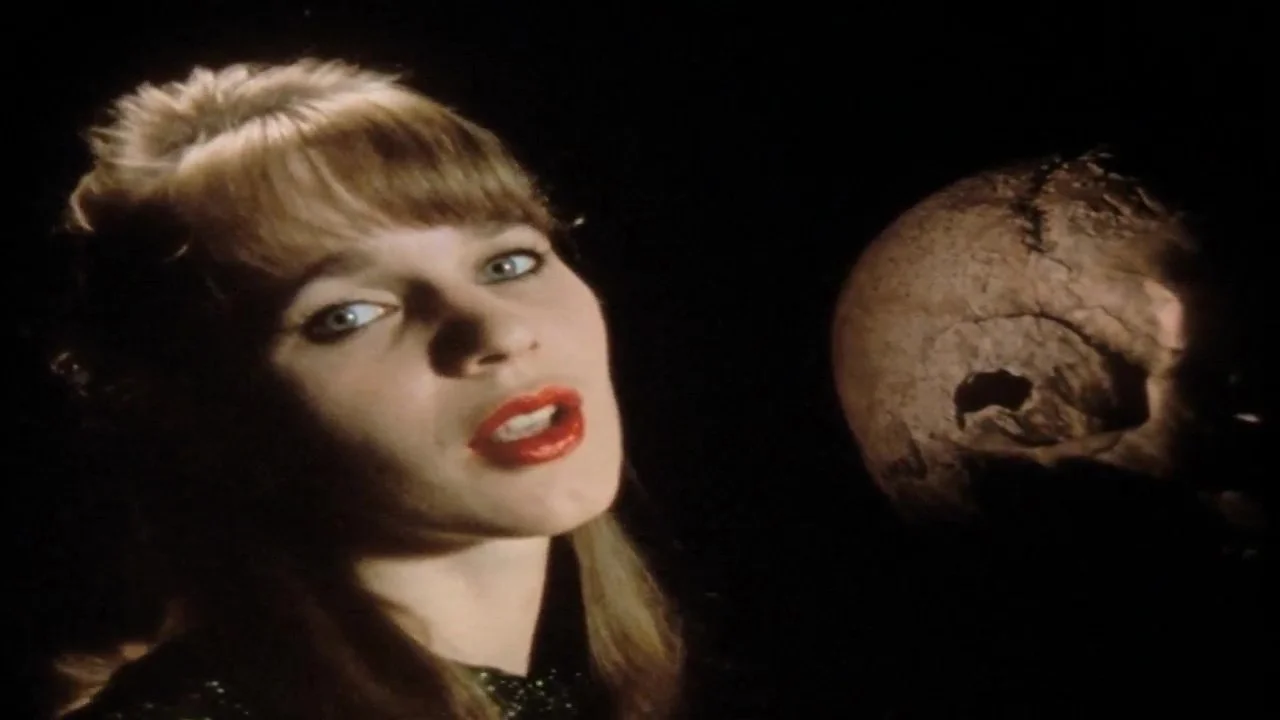[Editorial] “Aren’t People in Love Supposed to be Happy?” Nekromantik 2 (1991) Reaction
"I think she might be perverse.”
In the years that I have been following Zobo With a Shotgun, and in the time I have been able to call Zoë my friend, I have heard her refer to Nekromantik 2 (1991) as a love story. I didn’t really know anything about the movie, other than what Zoë said. This Valentine’s Day season, I decided to broaden my horizons with a new love story, as the director lovingly calls it, “The Return of the Loving Dead.” One quiet Saturday, after I finished supper (I figured I wouldn’t want to eat during this movie) and poured myself a drink (I thought I might need it), I pressed play on my Blu-ray. (Why do I have a Blu-ray of a cult necrophilia love story that I've never seen, you ask? I can’t be the only person who got a little tipsy at home during lockdown and bought a bunch of movies.) I’ve just finished the film, and here are my immediate reactions.
One of the special features on my Blu-ray is a short intro from the director, Jörg Buttgereit. He tells a touching story about saving his art from being destroyed and being able to proudly release it on home video in the future because he saved his negatives. He seems like he would be a kind and interesting guy to talk to, and I’d like to have a drink with him. The film opens with a quote from Ted Bundy, which immediately put me on edge. I knew this film was controversial, but I was surprised by the acknowledgement of a serial killer. But the quote makes sense with the rest of the film. I could write a plot synopsis, but even if you read a description of every scene, it wouldn’t be the same as seeing the film. The score, the performances, and yes, the gore, make the film greater than the sum of its gooey parts. The synopsis on Wikipedia will give you the plot points you need. I’d rather spend time processing the ideas behind the necrophilia, and the story of Monika (Monika M.) and Mark (Mark Reeder) trying to be happy. For a movie with “nekro” in the title, there’s not actually that much corpse sex.
Monika is a nurse who seems perfectly capable on her own, but lonely. Most of her family are dead, as evidenced by her photo album of many funerals. She digs up a fresh corpse and lovingly keeps it in her apartment but vomits the first time she tries to have sex with it. She first encounters Mark in a meet-cute outside a cinema when his date doesn’t show up, Mark and Monika start a sweet, very normal relationship. One morning, after staying the night with Monika, he finds a severed penis in her fridge. She must say something to make him accept it, because he doesn’t immediately run away. Instead, he poses as a corpse so she can take photographs. Mark is uncomfortable with this, and confides in a friend, “I think she might be perverse.” It’s interesting that Mark has found his limit, because his job is dubbing porn films. He sees relatively vanilla heterosexual sex every day and cashes his paycheck, and he doesn’t seem worried anyone will think he’s perverse. But when he encounters something outside what he is already comfortable with, he’s immediately shaken. Monika finds sex with Mark unsatisfying, which he doesn't seem to notice or care about.
Mark also shames Monika and her friends for the way they spend their time. Granted, it seemed strange to me, too. Mark comes over one night to find Monika and her friends, quietly and raptly, watching a video of a seal dissection. When Mark reacts with disgust, Monika defends herself, saying she finds it interesting. I thought of horror fandom at this moment. How many times have we horror fans found ourselves defending our hobby, defending the kind of art we appreciate and enjoy? A better partner to Monika would try to find a way to support her harmless hobbies, instead of asking her to change herself. Mark wonders aloud to his friend, “Aren’t people in love supposed to be happy?” And while he is talking about himself, the same is true for Monika. Nekromantik 2 is, at least in part, a story about a woman trying to find fulfillment and satisfaction. She is trying to be happy with a life that doesn’t suit her. She thinks she should be able to make it work, and she tries. But in the end, she can’t make Mark understand, and she has to …cut him out of her life…to find her happiness.
Monika and Mark’s first date at the cinema is seeing a very strange film (and I’m saying that as a person who just watched Nekromantik 2). In the film, there is a naked man and woman, sitting at a table on a roof, with a spread of soft-boiled eggs in decorative egg cups covering the table. As they eat egg after egg, the man is monologuing at the woman about ornithology. She’s quietly nodding along, and keeping eye contact, occasionally making affirmative sounds. The man doesn’t even seem to care if she is interested, he has subscribed her to Bird Facts whether she likes it or not. After the movie, while Mark is cooking eggs for himself and Monika, he says he really enjoyed the film because it was different from the films he always has to watch for work. The way the man in the film-within-a-film carried on without caring about his partner's interest mirrors the way Mark expects Monika to fall in line with his expectations, regardless of her wants. Eggs are more than a symbol of fertility; they are a very necessary part of fertility. They are part of a woman, and the characters consume them without a second thought. When Monika consumes male body parts - not through eating, but through severing and savoring - it’s much more shocking. And look, I know that eating eggs from the grocery store is not the same thing as murder and/or desecrating a corpse. But in the symbols of the film, eggs show the way men’s desires are a given while women's desires are taboo and to be hidden.
Using necrophilia as a symbol is taboo and shocking, but that doesn't make the story less thoughtful. I interpret Nekromantik 2 as a story about finding yourself, loving yourself, and getting what you need out of life.


























![[Editorial] “I control my life, not you!”: Living with Generalised Anxiety Disorder and the catharsis of the Final Destination franchise](https://images.squarespace-cdn.com/content/v1/5fe76a518d20536a3fbd7246/1696444478023-O3UXJCSZ4STJOH61TKNG/Screenshot+2023-10-04+at+19.30.37.png)
![[Editorial] 5 Slasher Short Horror Films](https://images.squarespace-cdn.com/content/v1/5fe76a518d20536a3fbd7246/1696358009946-N8MEV989O1PAHUYYMAWK/Screenshot+2023-10-03+at+19.33.19.png)
![[Ghouls Podcast] Maniac (2012) with Zoë Rose Smith and Iona Smith](https://images.squarespace-cdn.com/content/v1/5fe76a518d20536a3fbd7246/1696356006789-NYTG9N3IXCW9ZTIJPLX2/maniac.jpg)
![[Editorial] If Looks Could Kill: Tom Savini’s Practical Effects in Maniac (1980)](https://images.squarespace-cdn.com/content/v1/5fe76a518d20536a3fbd7246/1694952175495-WTKWRE3TYDARDJCJBO9V/Screenshot+2023-09-17+at+12.57.55.png)
![[Editorial] Deeper Cuts: 13 Non-Typical Slashers](https://images.squarespace-cdn.com/content/v1/5fe76a518d20536a3fbd7246/1694951568990-C37K3Z3TZ5SZFIF7GCGY/Curtains-1983-Lesleh-Donaldson.jpg)
![[Editorial] Editor’s Note: Making a slash back into September](https://images.squarespace-cdn.com/content/v1/5fe76a518d20536a3fbd7246/1694354202849-UZE538XIF4KW0KHCNTWS/MV5BMTk0NTk2Mzg1Ml5BMl5BanBnXkFtZTcwMDU2NTA4Nw%40%40._V1_.jpg)